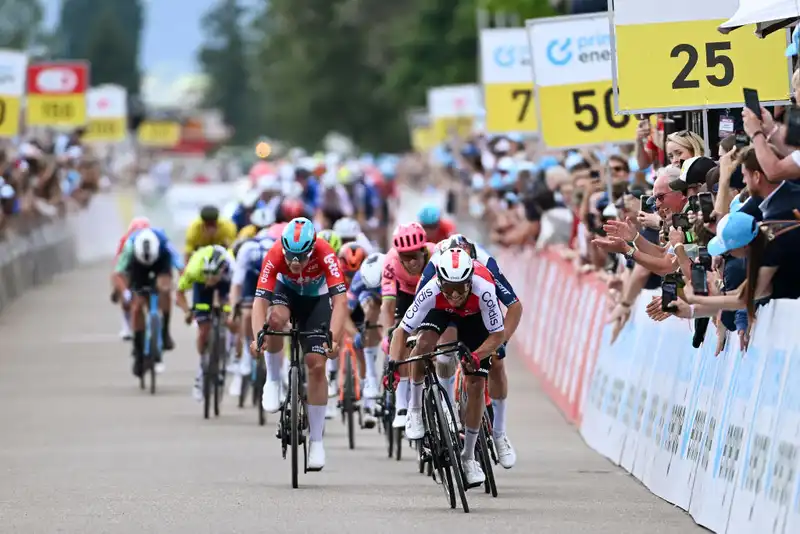The UCI on Wednesday announced three new measures to improve road race safety: subtle changes to the 3km rule, the calculation of time gaps within the peloton in sprint stages, and a new "yellow card" system to punish habitual offenders who break the rules during races.
The changes will be tested during the 2024 season, with the "selection stages" of the Tour de France being used as a testing ground for more flexible collective sprint rules.
The yellow card system will be implemented this year without sanctions, but starting January 1, 2025, the rulebook will include a system with tougher penalties for repeat offenders.
All changes are based on the recommendations of the SafeR project, an independent group that analyzes risks and provides safety advice during races in the UCI World Tour, Women's World Tour and Pro Series.
"SafeR shows that all cycling families can work together to improve safety," said Christian Prudhomme, general director of the Tour de France.
"These latest initiatives show that our rules can evolve as our sport continues to develop and face new challenges. Certain measures have already been introduced in the Tour de France, which demonstrates the collaboration to improve the safety of the cycling family."
"The Tour de France has already introduced a number of measures to improve the safety of the cycling family.
The yellow card system will begin on August 1, 2024, and the UCI noted that the cards will not be physical, like a soccer, but will be listed in the race communiqué, just like current rule violations.
What is different is that the UCI will track the number of violations for each member of the race formation and issue suspensions of up to 30 days for multiple violations.
"An extensive study conducted last year showed the need for a yellow card system in cycling.
"These initial measures recommended by SafeR to the UCI show that riders' requests are being heard and acted upon. This is extremely important and we are making great progress in this area. There is still much work to be done and we look forward to continuing the solid work that has been begun."
[20Until January 1, 2025, the current UCI points system and the Swiss franc fine system will continue. Each infraction will be registered in the yellow card database, but no suspensions will be imposed until next year.
The proposed penalties once the system is in place are disqualification and a 7-day suspension for two yellow cards in the same race, a 14-day suspension for three yellow cards in 30 days, and a 30-day suspension for six yellow cards in one year.
However, once the punishment for multiple yellow cards is completed, the individual's record will be clean again.
If an athlete is suspended for accumulating multiple yellow cards during a race, he or she will be expelled from the race, but will retain the results and UCI points earned during the race.
Yellow cards will be issued to riders, team staff, race vehicle drivers, or anyone else who engages in behavior that "may endanger the safety of the competition." In addition, the system aims to hold all these people accountable by introducing monitoring of bad behavior over time and consequently encouraging respectful behavior."
[32Rule violations subject to yellow cards:
The UCI is trying to make the "3 km rule" more flexible, whereby if a rider stops due to a crash or mechanical problem, he is given the same time as the group he was with before. This distance was previously 1 km, but was extended in 2005.
During the Tour de France, the UCI will further extend this rule to 5 kilometers and experiment with a maximum time difference between groups of 3 seconds instead of 1 second.
The distance between riders will be approximately 50 meters instead of 17 meters, giving non-sprinters more time to endure the chaos of a group gallop without sacrificing their overall ranking.
"Feedback has shown that the majority of racers want the 3km rule extended to reduce stress in the hectic final stages of the race," Hansen said.
"We are happy that this rule will be tested in several sprint finals of the Tour de France and thank the UCI and ASO for allowing it.
Race radios/earpieces also appeared in the press release, with the UCI announcing that they will "test the effect of restricting the wearing and use of earpieces at this year's races" but not deciding when or how the restriction will be tested, limiting earpieces to two riders per team as an example.
The UCI attempted to ban earpieces in 2011, testing a total ban during stage 10 of the Tour de France. Teams proposed allowing two riders per team to wear earpieces, but this was rejected by the UCI.
By the end of 2011, the issue was being heavily scrutinized, with teams threatening to boycott the Tour of Beijing if the UCI did not ban the use of radios in races altogether. Eventually, the UCI banned radios in lower-level races and world championships.
.

Comments